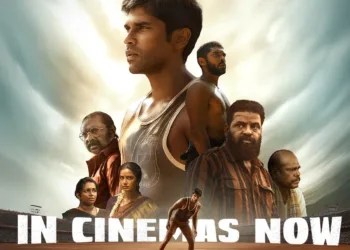Marvel Studios is undergoing a strategic transformation, prioritizing budget efficiency and selective project development as the superhero landscape evolves. With changing global markets and audience preferences, the Disney-owned studio is making calculated moves that prioritize younger talent for cost management while maintaining creative ambitions for highly anticipated sequels.
Table of Contents
Marvel’s New Financial Reality: Adapting to a Post-Pandemic World
The entertainment giant faces a dramatically different landscape than the pre-COVID era of billion-dollar blockbusters. The recent “Fantastic Four: First Steps” pulled in $218 million globally, with an overseas haul of $100 million, including an anemic $4.5 million from China, highlighting the stark contrast to previous successes. This represents a significant shift from the days when “Avengers: Endgame” nabbed $614 million from the Middle Kingdom alone in 2019.

Industry insiders acknowledge this new reality. “There’s a reset of what a hit is, and I don’t see them consistently hitting $1 billion as before — without China, with Disney+ exposure, post-COVID, without megastars,” explains a top agent representing several Marvel clients. This assessment reflects the broader challenges facing the superhero genre in today’s market.
The financial implications extend beyond individual film performance. Wall Street analysts recognize Marvel’s critical role in Disney’s overall strategy. “Marvel is a critical piece to Disney’s overall premium IP. And the stronger Marvel is, the better it is for the overall company,” notes analyst Robert Fishman at MoffettNathanson, emphasizing how Marvel’s success drives subscriber growth at Disney+ and accelerates Disney’s broader business ecosystem.
Black Panther 3: Ryan Coogler’s Vision Takes Shape
One of the most exciting developments in Marvel’s current slate involves the highly anticipated third installment of the Black Panther franchise. Ideas are percolating on a Ryan Coogler-helmed “Black Panther 3,” creating excitement internally at Marvel Studios, signaling strong confidence in the project’s potential.

The project has gained additional star power with Denzel Washington casually telling Australia’s “Today” that Coogler was writing a part for him in “Black Panther 3”, though Marvel has yet to officially unveil the sequel. This potential collaboration between two powerhouse talents has generated significant buzz within the industry and among fans.
Strategic Timing and Development
Unlike projects facing budget constraints, Black Panther 3 appears to have Marvel’s full support. The franchise’s previous entries have proven both critically and commercially successful, making it a priority despite the studio’s more cautious approach to other properties. The involvement of Coogler, who directed both previous films, ensures continuity in vision and storytelling approach.
The timing of the project also aligns with Marvel’s broader strategy of focusing on established, successful franchises while being more selective about new ventures. This approach reflects lessons learned from recent market performance and audience reception.
X-Men Reboot: Youth-Focused Casting for Budget Management
Marvel’s approach to the long-awaited X-Men reboot demonstrates the studio’s new cost-conscious strategy. Marvel has indicated to reps that it is looking for younger talent, rather than A-listers, to “keep the cost down,” according to industry sources. This strategy represents a significant departure from the star-studded casts of previous superhero blockbusters.
“Thunderbolts*” director Jake Schreier is helming the MCU’s “X-Men” reboot, bringing fresh perspective to the beloved mutant franchise. The decision to prioritize younger, less expensive talent over established stars reflects Marvel’s adaptation to current market realities and budget considerations.
Production Timeline and Expectations
The X-Men project faces realistic timeline expectations. Marvel is holding July 23, 2027, on the release calendar for an unnamed film, but sources say it won’t be filled by “X-Men”, indicating the project will likely arrive later in the decade. This extended timeline allows for careful development and casting processes aligned with the studio’s budget-conscious approach.
The casting strategy emphasizes discovering new talent rather than securing expensive star power, potentially creating opportunities for breakthrough performances while maintaining financial viability.3
Marvel Studios Project Priority Analysis
| Project | Priority Level | Director | Status | Estimated Timeline |
|---|---|---|---|---|
| Black Panther 3 | High | Ryan Coogler | Early Development | TBA |
| X-Men Reboot | Medium-High | Jake Schreier | Pre-Production | Post-2027 |
| Avengers: Doomsday | High | Russo Brothers | Pre-Production | Dec 2026 |
| Avengers: Secret Wars | High | Russo Brothers | Development | Dec 2027 |
| Spider-Man: Brand New Day | High | TBA | Post-Production | July 2025 |
| Blade Reboot | Low | TBA | Development Hell | TBA |
| Deadpool 4 | Low | TBA | Deprioritized | TBA |
Lower Priority Projects: Blade and Deadpool 4
Marvel’s strategic prioritization has relegated some previously anticipated projects to lower status. Amid an industrywide pullback on superheroes, the Marvel brain trust is feeling no sense of urgency on the long-gestating “Blade” reboot or even a new “Deadpool” outing, according to industry sources.

This decision reflects careful market analysis and resource allocation. While both properties have dedicated fan bases, Marvel appears focused on projects with clearer paths to success and stronger internal enthusiasm.
Market Considerations
The superhero genre has experienced fatigue in recent years, with several high-profile disappointments affecting studio confidence. Marvel’s decision to slow development on certain projects demonstrates strategic patience rather than rushing productions to market without proper development.
Budget Management Strategies
Marvel’s new approach emphasizes cost control without sacrificing quality. The success of “Fantastic Four: First Steps,” which features a bona fide TV star in Pedro Pascal, who has made his mark on the small screen in everything from “The Mandalorian” to “The Last of Us,” demonstrates how strategic casting can maintain audience appeal while managing expenses.
Disney hasn’t given a precise figure on the film’s budget, only pegging it at somewhere north of $200 million, but the manageable cost structure provides a template for future productions.
Budget Strategy Comparison
| Approach | Previous Era (2019-2021) | Current Era (2025+) |
|---|---|---|
| Star Salaries | $20-50M+ per A-lister | Focus on emerging talent |
| Total Budgets | $300-400M+ | $200-250M target |
| International Focus | China-dependent | China-independent |
| Release Strategy | Rapid expansion | Selective, quality-focused |
| Risk Tolerance | High | Conservative |
Balancing Star Power and Costs
While pursuing cost efficiency, Marvel isn’t abandoning star power entirely. “Avengers: Doomsday” will feature at least one mega-payday in Robert Downey Jr., who is returning to the Marvel fold as villain Doctor Doom. However, such high-cost casting appears reserved for tentpole Avengers films rather than individual character movies.
Future Outlook: Strategic Phase Planning
Marvel’s upcoming release schedule reflects this strategic approach. The next Marvel movie to hit theaters is “Spider-Man: Brand New Day” on July 31, followed by “Doomsday” in December and “Avengers: Secret Wars” in December 2027. This spacing allows for careful development and quality control.
The studio’s measured approach contrasts with previous years of rapid expansion, suggesting lessons learned from market feedback and performance analysis. This strategy prioritizes sustainable success over rapid expansion.
Long-term Vision
Marvel’s current strategy appears designed for long-term sustainability rather than short-term market dominance. By focusing on cost management, strategic casting, and selective project development, the studio positions itself for continued success in an evolving entertainment landscape.
The emphasis on younger talent for projects like X-Men could also create new star power for future phases, potentially reducing long-term costs while building fresh audience connections.
Industry Impact and Analysis
The changes at Marvel reflect broader industry trends toward more conservative approaches to tentpole filmmaking. “I think as an industry we’ve become very obsessed with opening-weekend results, in particular with both ‘Superman’ and ‘Fantastic Four’,” observes analyst Shawn Robbins of Box Office Theory, highlighting how success metrics have evolved.
This strategic shift acknowledges that “good is the new great, as the genre finds its footing after a cold streak” that included several recent disappointments across the superhero landscape.
Conclusion
Marvel Studios’ strategic recalibration represents a mature response to changing market conditions and audience preferences. By prioritizing budget efficiency for properties like X-Men while maintaining ambition for proven franchises like Black Panther, the studio demonstrates adaptive leadership in an evolving entertainment landscape.
The focus on sustainable practices and strategic project selection positions Marvel for long-term success, even as it navigates the challenges of a post-pandemic, globally fragmented market. This approach may sacrifice some short-term spectacle for long-term viability, but it reflects the realities of modern blockbuster filmmaking.
As the superhero genre continues evolving, Marvel’s willingness to adapt its strategies while maintaining creative ambitions suggests the studio remains committed to delivering quality entertainment within realistic financial frameworks.
Read More: Monica Barbaro Seals the Deal: Oscar Nominee Confirmed for Luca Guadagnino’s ‘Artificial’
FAQs
When will Black Panther 3 be released?
Marvel has not officially announced a release date for Black Panther 3. While director Ryan Coogler is developing ideas for the film and has discussed potential casting including Denzel Washington, the project remains in early development stages.
Why is Marvel casting younger actors for the X-Men reboot?
Marvel is prioritizing younger talent over A-list stars for the X-Men reboot to “keep the cost down” according to industry sources. This budget-conscious approach reflects the studio’s adaptation to current market realities and reduced international box office potential.
What happened to the Blade reboot and Deadpool 4?
Both projects have been deprioritized by Marvel Studios. The company is feeling “no sense of urgency” about the long-gestating Blade reboot or a new Deadpool film, focusing instead on other projects with clearer development paths.
Who is directing the X-Men reboot?
Jake Schreier, who directed “Thunderbolts*,” has been tapped to helm Marvel’s X-Men reboot. The studio is currently fine-tuning Michael Lesslie’s script and will begin casting soon.
How has Marvel’s budget strategy changed?
Marvel has shifted toward more cost-conscious production approaches, exemplified by casting TV stars like Pedro Pascal in “Fantastic Four” rather than expensive A-listers. This strategy aims to maintain quality while adapting to reduced international market potential, particularly in China








